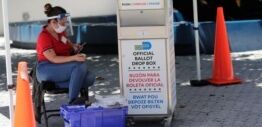正文
VOA慢速英语:美国大选投票问题出现分歧
There is a new divisive issue in the U.S. presidential election: the ballot drop box.
The issue has taken on new urgency following cost-cutting measures at the U.S. Postal Service. The measures have slowed mail delivery nationwide.
U.S. election officials are preparing for a major expansion of mail-in voting. Experts say up to half of voters in the November 3 election may choose to not vote in person.

Democrats want drop boxes, Republicans do not
Democrats across the country are promoting drop boxes as an easy and reliable choice for voters who do not want to entrust their ballots to the U.S. Postal Service.
In Connecticut, Secretary of State Denise Merrill is recommending that voters turn in their ballots by drop box rather than through the mail. She made the recommendation after receiving reports that some ballots mailed a week before her state's August 11 nominating contests arrived too late to be counted.
Three-quarters of ballots in that August primary were cast absentee, she said. Merrill, a Democrat, said the state's 200 new drop boxes had proven a safe and popular choice.
"I do not understand why people think they're such a problem," Merrill said. "They're more secure than mailboxes."
Republicans in Pennsylvania do not share that opinion.
Bruce Marks is a former Republican state senator from Pennsylvania. He said drop boxes do not offer trust that the person turning in a ballot is the person who cast that vote.
"There's no one watching or tracking," he said.
Pennsylvania's Democratic Governor Tom Wolf has defended the state's use of drop boxes. He argues they are legal and necessary, especially during the coronavirus crisis.
President Donald Trump, a Republican, won the state of Pennsylvania by less than 1 percentage point in 2016. Public opinion studies show that he is running behind Democratic candidate Joe Biden in the presidential race.
Trump's re-election campaign has taken legal action to prevent the use of ballot drop boxes in Pennsylvania. The campaign says the boxes could lead to voting fraud. Republican officials in other states have already prevented the use of drop boxes.
In neighboring Ohio, Republican Secretary of State Frank LaRose said last week that he did not want to risk similar legal action from the Trump administration. He announced he would permit one drop box for each of the state's 88 counties. He said the Republican-controlled legislature had not given him the power to provide more.
Democrats are urging LaRose to change his decision. They note that the decision leaves the 864,000 registered voters in Cleveland's Cuyahoga County with the same number of drop boxes as the 8,400 registered voters in Vinton County. Cuyahoga County voters are majority Democrat. Vinton is a majority Republican county.
In hotly contested Florida, Democrats in Miami-Dade County are seeking to make it easier for voters to use drop boxes.
Unlike other counties in the state, Miami-Dade voters must provide election officials with identification when putting a ballot in a drop box. Election workers also record a number printed on the voter's envelope.
The process can take up to three minutes, the Democratic Party said in a letter to local election officials. The party is seeking to permit voters to drop their ballots quickly without the processing requirements.
Security measures required for ballot drop boxes differ from state to state. In Montana, at least two election officials must be present at the boxes. In New Mexico, the boxes are watched by video.
Some say the drop box battle is unnecessary.
Before 2020, eight states — Arizona, California, Colorado, Hawaii, Montana, New Mexico, Oregon and Washington — had laws explaining how and where drop boxes could be used.
Returning ballots this way proved popular. In Colorado, Oregon and Washington, more than half of mail ballots were returned either to a drop box or to an election office in the 2016 presidential election. Those numbers come from a Massachusetts Institute of Technology study.
Drop boxes have not caused debate in those states, said Murphy Bannerman of Election Protection Arizona, a voting-rights group.
"Both parties use it at a really high rate," Bannerman said. "So a lot of those tensions don't exist here."
I'm Ashley Thompson.
The Reuters news agency reported this story. Ashley Thompson adapted it for VOA Learning English. Hai Do was the editor.




 手机网站
手机网站